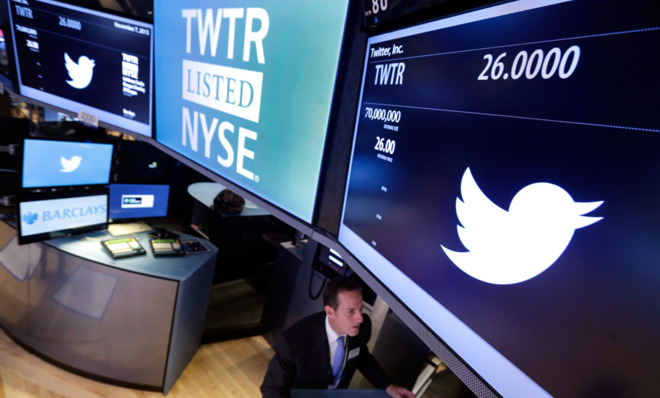Twitter goes public: Everything you need to know about the tech company's IPO
Despite years of net negative cash flow, Twitter is nonetheless expected to raise billions of dollars on Thursday


A free daily email with the biggest news stories of the day – and the best features from TheWeek.com
You are now subscribed
Your newsletter sign-up was successful
Today is finally the day. After months of hype and buildup, shares of Twitter will go on sale Thursday morning in the most highly anticipated initial public offering of the year.
Should you buy? Should you Tweet? Should you buy and then Tweet about buying?
Here's what you need to know:
The Week
Escape your echo chamber. Get the facts behind the news, plus analysis from multiple perspectives.

Sign up for The Week's Free Newsletters
From our morning news briefing to a weekly Good News Newsletter, get the best of The Week delivered directly to your inbox.
From our morning news briefing to a weekly Good News Newsletter, get the best of The Week delivered directly to your inbox.
Rising share price
Twitter originally said it expected to price shares between $17 and $20. But with demand going up, so, too, did the asking price.
Shares will now start at $26, a price that would place Twitter's overall valuation at $18.3 billion. Twitter on Monday had already raised the estimated price range to $23-$25, but settled on the higher price at the end of the day Wednesday.
The anti-Facebook IPO
A free daily email with the biggest news stories of the day – and the best features from TheWeek.com
Even though the initial share price has gone up ahead of the IPO, Twitter executives didn't want to push it too high for fear of creating a bubble within their own stock.
That's what happened with Facebook's bungled IPO, when a steep share price sparked a flurry of activity and caused the stock to quickly peak, before everyone realized the shares were drastically overpriced. Within three months, Facebook shares had lost more than half their value.
Twitter also opted to list on the New York Stock Exchange instead of the more tech-centric Nasdaq, where Facebook trades.
70 million
That's the self-imposed cap Twitter has placed on the amount of stock it will initially sell. For comparison, that's about one sixth the number of shares Facebook sold (421 million) in its IPO last year.
Despite increased demand ahead of the IPO, Twitter has stood pat and declined to put more shares up for sale just yet.
Big banks stand to gain big
While your average Joe can certainly try to get rich by getting in early on an IPO, it's the major investors and underwriters who come away with the most green. Those parties are usually issued shares before a company goes public, and at a lower rate than the opening-day asking price. If the stock pops on day one, the financial backers stand to gain a ton of money.
In that respect, an IPO is "ultimately designed to transfer money from retail investors to the company, bankers, early investors, and other insiders who were issued stock at a preferred price," wrote CBS's Erik Sherman.
It will be no different with Twitter, with an IPO underwritten by Goldman Sachs, JPMorgan Chase, and other financial titans.
Buy now — or maybe don't
There's absolutely no consensus from financial experts about whether or not you, the average person, should hop on board the Twitter train.
With such a limited stock pool, it's possible a feverish race to buy in will cause the share prices to skyrocket, and then plunge.
"There is a large potential for investors pushing the price up too much and getting burned," Jay Ritter, a finance professor at the University of Florida, told USA Today.
Furthermore, Twitter, like most tech startups, has yet to prove that it can actually make the kinds of healthy profits that would justify its stock market hype. Then again, Twitter is hoping to broaden its user base and better monetize ads, which could result in long-term financial health. If you believe the company can ultimately become massively valuable, then buying stock and holding on to it — through all the roller-coaster ups and downs — wouldn't be such a bad idea.
Facebook's stock, for example, eventually did return to its formerly lofty heights.
Beware of stock exchange glitches
When Facebook went public, it caused all sorts of problems for Nasdaq's trading system, which couldn't handle the heavy load. As a result, many investors had no idea for hours whether their deals had gone through.
That shouldn't happen with Twitter. New York Stock Exchange officials ran a first-ever weekend simulation of a massive IPO in October to test the exchange's infrastructure. The system worked, and is expected to be fully functional once Twitter-mania hits.
The $1 billion man
Obviously, the brains behind Twitter are due for a huge pay day. But only one, founder Ev Williams, is expected to crack the $1 billion mark through the IPO, becoming one of the few people who can actually say, "A million dollars isn't cool. You know what's cool? A billion dollars."
Others, like Chairman Jack Dorsey, are expected to rake in hundreds of millions of dollars. Not too shabby.
Jon Terbush is an associate editor at TheWeek.com covering politics, sports, and other things he finds interesting. He has previously written for Talking Points Memo, Raw Story, and Business Insider.
-
 The environmental cost of GLP-1s
The environmental cost of GLP-1sThe explainer Producing the drugs is a dirty process
-
 Greenland’s capital becomes ground zero for the country’s diplomatic straits
Greenland’s capital becomes ground zero for the country’s diplomatic straitsIN THE SPOTLIGHT A flurry of new consular activity in Nuuk shows how important Greenland has become to Europeans’ anxiety about American imperialism
-
 ‘This is something that happens all too often’
‘This is something that happens all too often’Instant Opinion Opinion, comment and editorials of the day
